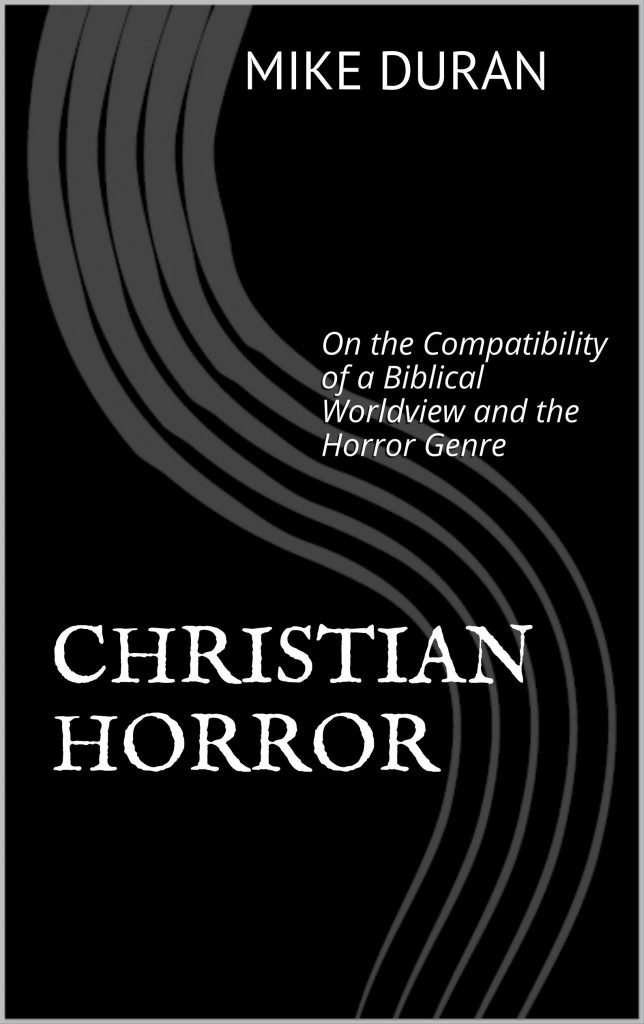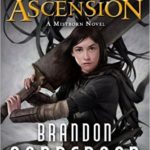Horror Is Based In A Biblical Worldview, Part 1
Novelist Mike Duran joins us for a two-part conversation to share the stories and themes of his new nonfiction work about Christians-exploring-horror, Christian Horror.
ESB: Mike, thanks for joining us. You’ve written supernatural/paranormal/fantastical novels, such as The Ghost Box and The Telling, as well as shared prolific thoughts at MikeDuran.com. What led to you branching out into this nonfiction book, and why explore the topic of horror?
Mike: Well, it’s an idea that’s been fermenting for a while.
Back in 2007, I attended a Christian writer’s conference in nearby Orange County, California. Dave Long, who at the time was an acquisition editor for Bethany House, hosted a workshop on the state of the Christian fiction market. He mentioned T.L. Hines’ then-newly released novel Waking Lazarus. The story is about a man who dies, is resuscitated multiple times, and as a result, discovers he possesses clairvoyant-like powers.
During his lecture, Long referenced Hines’ novel as horror, with this caveat: “Christians don’t like the word ‘horror,’ so the book is labeled as Supernatural Suspense.” It got me thinking about why the term was so oft-putting for evangelical readers and publishers, especially when so many horror tropes are rooted in a biblical worldview.
Over the years, observing the Christian market and interacting with writer fans and friends has reinforced the tenuous relationship between evangelicals and the horror genre.
Much of it relates to the branding of contemporary Christian fiction. Horror is a tough fit in a market where “safe,” “inspirational,” and “family-friendly” have become monikers for our brand. But I also discovered something more troubling: a lack of compelling arguments for the incompatibility of a biblical worldview and the horror genre.
 I wrote Christian Horror with the idea of building a case for evangelicals reassessing the genre while attempting to answer some of the most common objections.
I wrote Christian Horror with the idea of building a case for evangelicals reassessing the genre while attempting to answer some of the most common objections.
ESB: For my part, I’m not a horror-genre “buff.” I don’t care for films about zombies, demon possessions, or poor folks chained in prisons and forced to play games. But I know this book is necessary because other stories include horror images; also, horror is so prevalent in our culture. What could you say to Christians who are open to fantasy but recoil from “horror”?
Mike: In a way, people should recoil from horror. I mean, the genre often aims to stir visceral and powerful emotions. Frankly, I’d be more concerned about someone who delights in the dark and horrific than someone who is repelled by it.
![[Citation required.]](http://www.speculativefaith.lorehaven.com/wp-content/uploads/2011/07/excerpt_nervouswitch.jpg)
[Better citation required.]
In both cases, what we’re dealing with is a certain approach to art and culture. The lines are just drawn differently per group.
I’ve discovered that in many cases what people are repulsed by is a caricature of the genre, not what actually comprises the entire genre. For example, when they think of horror they immediately think of slashers, gore, or torture porn. But these represent a fairly small segment of the canon of horror.
For those who reject horror simply on the basis of gore, it’s helpful to point out “classic” novels like The Picture of Dorian Grey, Dr. Jekyll and Mister Hyde, I Am Legend, or Something Wicked This Way Comes which contain little graphic content.
Likewise, there’s plenty of contemporary horror films that veer away from excessive blood and guts. Films like Signs, Rear Window, Misery, or even the Blair Witch Project contain minimal to no gore. Point being, it’s unfair to lump all horror into the category of “gore.”
ESB: What horror-genre stories — films, novels, television — have captivated you? Why might these interest you more than other genres popular with Christians, especially fantasy?
Mike: I’m a fantasy fan, so I’d have a hard time favoring one genre over the other.
 In reality, horror elements occur in many fantasy novels and films. Peter Jackson’s Lord of the Rings trilogy contains many horrific images: the Ring Wraiths, the Dead Army, and Saruman (portrayed fittingly by horror film veteran Christopher Lee), just to name a few.
In reality, horror elements occur in many fantasy novels and films. Peter Jackson’s Lord of the Rings trilogy contains many horrific images: the Ring Wraiths, the Dead Army, and Saruman (portrayed fittingly by horror film veteran Christopher Lee), just to name a few.
As a kid, I was weaned on The Twilight Zone and Ray Bradbury, both which regularly veered into the horror genre. Perhaps what fascinated me — and continues to fascinate me — is the way so much horror assumes a real spiritual dimension and explores the realm of the supernatural. Sure, some of those ventures are anything but orthodoxy. Nevertheless, in many horror tales there is an assumption that we live in a supernatural universe, one filled with bizarre phenomena and non-human beings. This jibes with Scripture.
Horror may be the one genre that regularly emphasizes a supernatural, non-materialistic view of the world. Hell, heaven, the afterlife, demons, sin and divine judgment are recurrent themes in the horror genre. Coincidentally, they are all tethered to a biblical worldview.
To be continued Friday, June 5. You can read a preview of Christian Horror or purchase the book on Amazon.










































Aaaand there’s a Chick tract to the side. Just sitting there, being all Chick-tract-y and gross.
True. Chick buys into magic/mysticism and made-up notions about about Christianity is and what’s happened in church history. That’s never a good thing.
That cartoon represents the worst in “Christian” use of popular arts and culture, I think: preachy, inaccurate (Ouija boards in Harry Potter???), false teaching, and a misuse of Scripture.
But about Mike’s interview, I like what he said about how people should recoil from horror. I don’t think I’ve heard that from an advocate for the genre before.
Becky
Becky, I have a real problem with someone who takes glee in darkness and pain. Thing is, it’s not necessarily the portrayal of darkness and pain that’s the problem. In theory, someone could watch The Passion of the Christ and exalt in the gore. However, the intent of the director was not to satiate someone’s thirst for gore. Far from it. I’d suggest that the purpose of the Christian author is to portray evil as evil, which means he’s intending his audience to be repulsed. This, however, would not prevent a reader from taking glee in it.
Amen.
Similarly, we’re not supposed to like the concept of Hell. It should also make us recoil. But many Christians have fallen into uselessness, or even heresies, by taking the “speak no evil” notion way too far and thus avoiding certain truths.
Thanks, Stephen, for the interview.
I actually dislike Peter Jackson because he brought a splatterpunk sensibility into LOTR and King Kong. People forget he started as a director of ultraviolent horror films like Bad Taste and Dead Alive, and it shows in LOTR in a milder form. I don’t really get people who dislike horror but think those movies are awesome, because his enemy and creature designs are horror-inspired.
I grew up with horror too, but in the eighties, where it was more nihilist in its social commentary. I think to a point you can argue even those films helped, because they demolished a lot of the modernist idea that the world can be fixed perfectly. The idea that science could actually cause great harm, or be ineffective, really was a needed corrective to the “rocketship” scientism of the 50’s and 60’s. Sometimes I think you need to have that faith in christ-substitutes kicked out from under you, and maybe those horror movies helped.
Top five (definitely not Christian friendly) would be Return of the Living Dead (send more paramedics!), John Carpenter’s The Thing, David Cronenberg’s Scanners, The Innocents, and The Grudge.
I also recommend Mike’s book. Not many people even bother with Christian cultural criticism apart from the hot thing of the moment, but Mike does and really does it well. Now if we could just get him to write the next Reagan Moon book quicker…
Thanks, David. That’s a great observation about horror undermining Scientism. One thing I’d springboard off of regarding Jackson’s importing of a “splatterpunk sensibility” into LotR, is that this isn’t unique to Jackson. The horror genre over-all is rather malleable, so that many horror tropes and images have been integrated into more mainstream stories. Some examples: Event Horizon, typically labeled sci-fi, contains many horror elements. The Alien films all overlap with horror. Saving Private Ryan has incredibly graphic gore. A lot of Michael Crichton’s stuff contains horror elements (The Andromeda Strain, Terminal Man, Jurassic Park, Sphere, Prey, etc.). Even Indiana Jones contains some horrific moments (think Nazi man melting).
Somehow I have missed the term “splatterpunk.” Very apt, that.
Alas, the worst parts of the (still underappreciated) The Hobbit film trilogy are the “splatterpunk” bits. I don’t mean horror bits, like orcs’ limbs getting lopped off (which is still done rather tastefully and without gore in the films). Rather it’s just the dumb gross-out humor that doesn’t even succeed in grossing anyone out, such as the part in the second film when The Master of Laketown eats pig testicles. Ha ha! So gross! Oh wait, no it’s not, it’s completely awkward and unfunny and adds nothing whatsoever to the story. In the behind the scenes of the extended edition you can tell everyone is just pretending that it will somehow be very amusing. You can also tell that Peter Jackson was descending into his worst proclivities and they all but directly state that the other writers (Boyens and Walsh?) had to rein him in.
With all that nonsense going on, I put up perfectly fine with the action-silly bits.